Contents
Tomato domes – one of the relatively new varieties. The originator declares its undemanding care, consistently high yields and excellent fruit quality. The experience of gardeners who grew a hybrid, in general, confirms this information. The novelty looks quite promising and suitable for beginner gardeners.
The story of
The domestic tomato hybrid domes F1 is an achievement of the team of breeders of the Tsvetushchy Sad agricultural company. It appeared on sale quite recently (in 2017), so it is not yet listed in the State Register of Breeding Achievements. It is also not known whether the originating agro-firm filed a corresponding application.
Description of tomato variety domes F1
domes F1 – determinate tomato hybrid. This property means that the height of the bush is “programmed” by the breeders in advance, the plants cannot stretch out more than up to 50-60 cm.
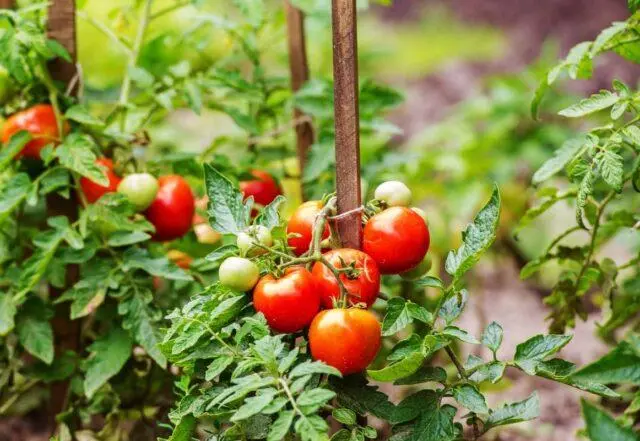
The bushes are quite powerful, “squat”, densely leafy
The fruits are a classic bright red color for a vegetable. The name of the hybrid is due to the original shape of the tomatoes – they are rounded, noticeably flattened, with a small but clearly distinguished sharp “nose”. The peel is glossy, fairly dense and elastic, which provides the crop with good keeping quality and transportability.
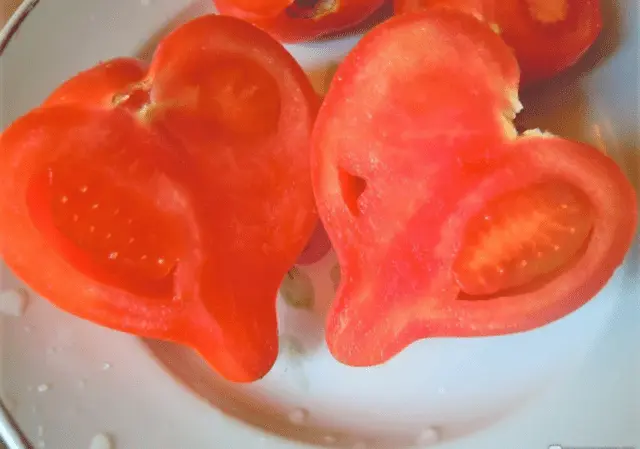
Seed chambers in tomatoes domes are small, there are few seeds in them, they are very small
Tomatoes are one-dimensional (weighing approximately 200 g). According to this indicator, the hybrid differs markedly for the better from other determinant varieties. The pulp of tomatoes is dense, not particularly juicy, “grainy” on the cut.
The taste is very good – rich, balanced. It clearly distinguishes both sweetness and light refreshing sourness. Tomatoes also have a pronounced aroma.
Characteristics of tomato domes
In the characterization and description of the hybrid, the seemingly obvious “discrepancy” between the compactness and short stature of the bushes and the declared yield immediately catches the eye. Nevertheless, the reviews of gardeners who managed to get acquainted with the hybrid confirm the information of the originator.
Ripening period and yield
domes – a tomato of medium early ripening. 95-105 days pass from the moment of emergence of shoots from seeds to harvesting. The specific period varies depending on the climate in the growing region and the weather conditions in each season.
In the description of the originator, the yield immediately attracts attention. According to the agricultural firm, it is 13-15 kg/m² in open ground and up to 17 kg/m² in greenhouses. This became possible due to the carpal type of fruiting and the frequent “laying” of clusters. The first one is already formed above the 6-7th sheet, the next ones – with an “interval” of three sheets.
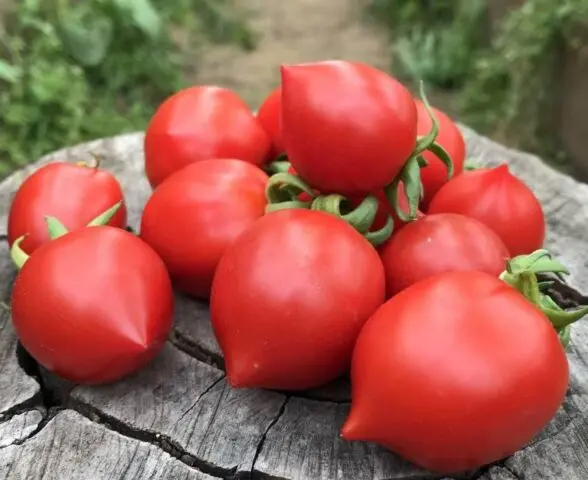
In each brush of tomatoes domes 4-6 fruits
Disease and pest resistance
Immunity in tomatoes domes is not too high. Plants are prone to infection by any of the pathogens typical of the culture, if the weather conditions favor the activation of the pathogen.
Pests to the hybrid domes, according to the description of the originator and reviews of gardeners, do not show much interest. Although the experience of growing these tomatoes is not yet rich enough to say for sure.
How to use
The purpose of tomatoes is universal. They are suitable for fresh consumption, and for the preparation of any first and second courses. For whole-fruit canning, this is not the best option due to the rather large size of the fruit, although dome tomatoes look presentable even after heat treatment – the skin rarely cracks, color saturation and pulp density remain. These tomatoes are quite suitable for homemade sauces, ketchups, adjika, lecho.
Advantages and disadvantages
Several specially created “parental” varieties were used to breed the Domes tomato. Therefore, for determinant hybrids, it is not too typical, differing for the better in yield and large-fruited.
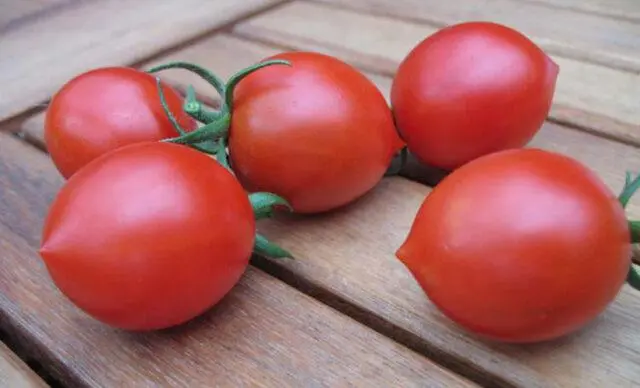
Tomatoes domes after harvest can be stored without loss of quality for two months
Pros:
- comparative undemanding in care;
- the possibility of landing in open ground and in the greenhouse;
- compactness of bushes;
- stable high yield;
- original appearance, one-dimensionality, rather large fruit size;
- pleasant balanced taste, pronounced aroma;
- keeping quality and transportability are above the average for the culture;
- versatility of the appointment of tomatoes.
Cons:
- susceptibility to any pathogenic fungi typical of tomatoes;
- the impossibility of reproduction using seeds collected from self-grown fruits.
Features of agricultural technology
Despite the early ripening, the hybrid is grown in seedlings. Seed treatment with biostimulants and fungicides is recommended to improve germination and prevent fungal diseases. The easiest way is to immediately seat them in individual containers, avoiding further picks.
Seedlings are ready for planting in the ground at the age of 50-55 days. Seedlings grow up to 12-15 cm in height, have 3-4 true leaves. It is impossible to specify the specific dates for their landing in open ground and a greenhouse. Time is determined based on the local climate and weather in the current season. In central Our Country, you can focus on the first decade of May.
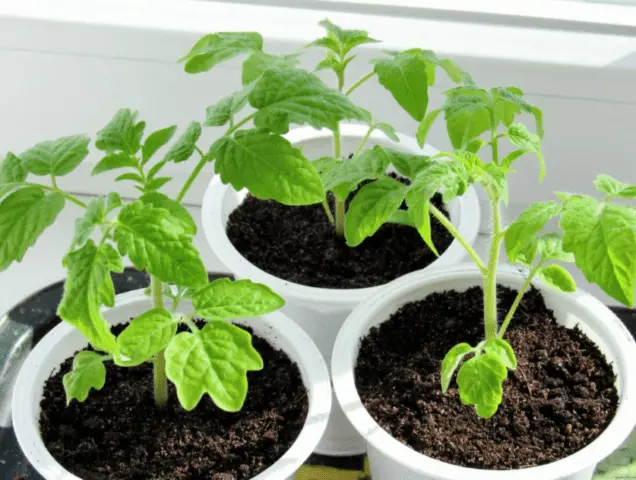
12-15 days before planting, it is recommended to start hardening off tomato seedlings domes
The compactness of the bushes allows compact plantings of up to 6-8 plants per 1 m². The minimum spacing between them is 35-40 cm with a row spacing of 55-60 cm.
Seedlings are planted in holes about 15 cm deep. A handful of humus and a tablespoon of sifted wood ash are thrown to the bottom. It can be replaced with complex fertilizers for tomatoes.
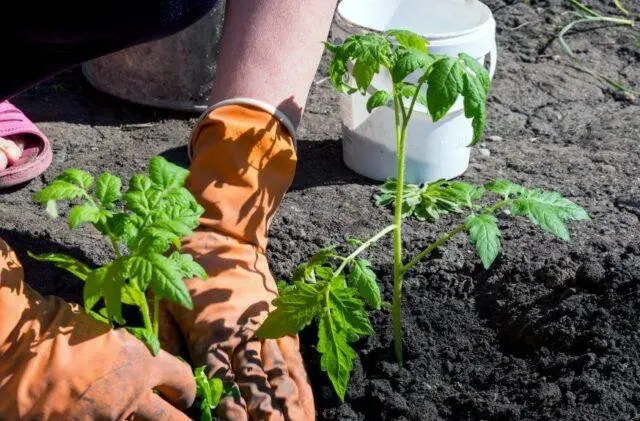
Tomato seedlings domes are buried in the soil to the lower cotyledon leaves, watered abundantly before and after planting
dome tomato care includes:
- Watering. Intervals vary depending on outdoor or greenhouse cultivation, rainfall frequency and intensity, and air temperature. On average, bushes are watered every 2-5 days, spending 4-5 liters of water per bush. In extreme heat, daily watering may be required.
- Loosening and weeding. You can refuse them, immediately after landing, filling the bed with mulch. Otherwise, domes will have to be loosened and weeded once every 10-15 days.
- Top dressing. Complex store-bought fertilizers are recommended – compact bushes, due to the large size of fruits and high yields, are greatly depleted, folk remedies cannot compensate for the resulting deficiency of nutrients in full.
- Bush formation. Plants are recommended to be kept in two or three stems, leaving, in addition to the central shoot, another 1-2 stepchildren below the first fruit brush.
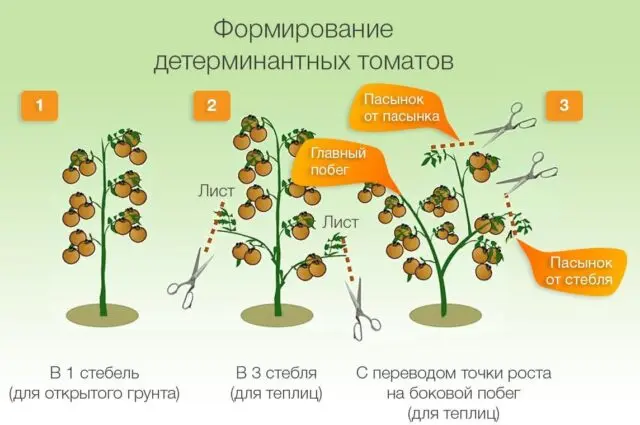
The formation of a tomato bush domes includes the regular removal of “extra” stepchildren – they should not be allowed to grow longer than 2-3 cm
Pest and disease control
One of the main disadvantages of the dome tomato is its low resistance to pathogenic microflora. To avoid the development of diseases will help simple preventive measures:
- accounting for crop rotation rules;
- compliance with the disembarkation scheme;
- providing access to fresh air plantings;
- prevention of waterlogging and drying of the substrate;
- regular site inspections.
Also, as part of the prevention of fungal diseases, pre-plant dressing of tomato seeds domes in a solution of any fungicide or potassium permanganate (pale pink) is recommended. They are also used for processing plants and soil after planting in open ground or in a greenhouse. The first spraying is carried out 12-15 days after the transfer of seedlings to the garden, then they are repeated throughout the season with an interval of 2-3 weeks.
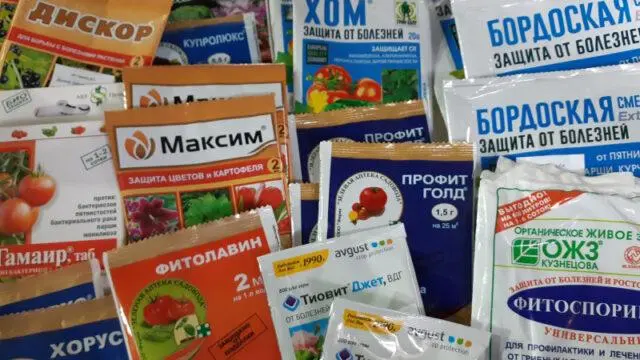
Any copper-containing preparations effectively destroy pathogenic microflora
Conclusion
Tomato Domes owes its name to the original shape of the fruit. In addition to the recognizable appearance, the hybrid has very good taste and high yield. However, it must be borne in mind that you can lose the entire crop if you do not regularly pay attention to the prevention of fungal diseases.









